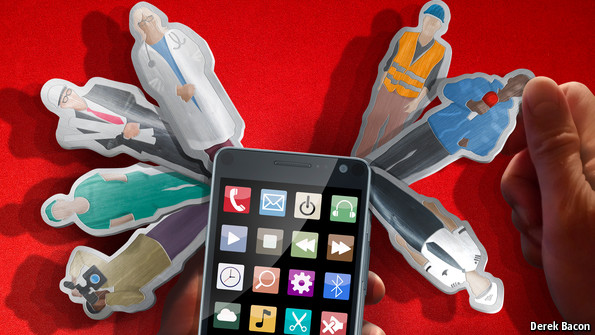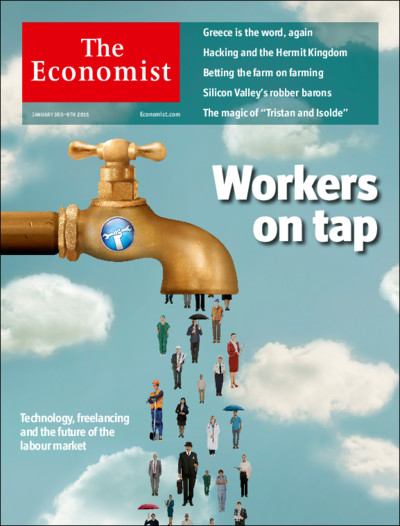The future of work
There’s an app for that — from economist.com
Freelance workers available at a moment’s notice will reshape the nature of companies and the structure of careers

Excerpt:
HANDY is creating a big business out of small jobs. The company finds its customers self-employed home-helps available in the right place and at the right time. All the householder needs is a credit card and a phone equipped with Handy’s app, and everything from spring cleaning to flat-pack-furniture assembly gets taken care of by “service pros” who earn an average of $18 an hour.
…
Handy is one of a large number of startups built around systems which match jobs with independent contractors on the fly, and thus supply labour and services on demand.
…
The obvious inspiration for all this is Uber, a car service which was founded in San Francisco in 2009 and which already operates in 53 countries; insiders say it will have sales of more than $1 billion in 2014.
…
This boom marks a striking new stage in a deeper transformation. Using the now ubiquitous platform of the smartphone to deliver labour and services in a variety of new ways will challenge many of the fundamental assumptions of 20th-century capitalism, from the nature of the firm to the structure of careers.
…
The on-demand economy will inevitably exacerbate the trend towards enforced self-reliance that has been gathering pace since the 1970s. Workers who want to progress will have to keep their formal skills up to date, rather than relying on the firm to train them (or to push them up the ladder regardless). This means accepting challenging assignments or, if they are locked in a more routine job, taking responsibility for educating themselves. They will also have to learn how to drum up new business and make decisions between spending and investment.
Also see:
Professional Millennials and super-powered smartphones are changing the working world — from medium.com and Liquid Talent
Excerpt (emphasis DSC):
This is the year when modern technology squarely intersects with the economy and the workforce. This is the the year that marks a noted change in how we work as individuals, and as a collective. This is the year of the Millennial Generation takeover in our professional world. This is the year that marks the beginning of the Independent Workforce Revolution.
Why?
Two reasons:
1) Millennials take over
Millennials are the largest generation at 82 million strong. They do not have the same priorities as past generations and their professional incentives are quickly changing. They care less about maximizing profit, finding a secure job and taking 2.5 weeks of vacay. In fact, 54% of Millennials assert that they want to start a company one day, or already have. This generation is now 50% of the workforce, and will be 75% of the workforce by 2020. These percentages may seem staggering but with 10,000 Baby Boomers retiring everyday (every single day!) we can see this tectonic shift happening before our very eyes.
2) Mobile technology
We have our economies in our pocket. We can work anytime from anywhere, and source professional opportunities with a simple swipe. The proliferation of mobile productivity apps (ie Slack), globalized workforce platforms (ie eLance) and professional networks (ie LinkedIn) show the power and growth in professional, mobile technologies.
From DSC:
I’ve said it before and I’ll say it again to those of us working in K-12 and in higher education:
We need to be sure that we’re preparing our students to know how to run their own businesses. They need to know how to survive and thrive as freelancers — because chances are they will be freelancing at various points in their career. Our curricula should already be in the process of being updated to address these critical skills. More courses on entrepreneurship for example; also some basic accounting courses as well as coursework involving programming, brainstorming, marketing, and how to use various technologies to collaborate, stay organized, and manage one’s time.
The above items also stress the need for lifelong, accessible/affordable learning; and for constant adaptation and for reinventing oneself in order to remain marketable in the workplace.
Addendum on 2/18/15:
New tech companies say freelancing is the future of work. But there’s a downside for workers. — from washingtonpost.com by Lydia DePillis
More companies are switching their workforce to freelance. Policy needs to catch up.
Excerpt:
If the nation’s way of regulating work revolves around a relationship between an employee and employer, what happens when that relationship no longer exists?









